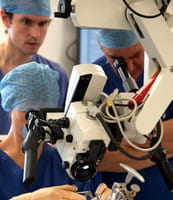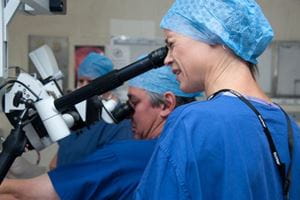Surgical Microscope Appeal
Thanks to the generous support of our friends and donors we hit our target over the festive period raising a total of £10,220 which will enable us to purchase our much needed surgical operating microscope.
The use of microsopes in surgery

The increased safety and accuracy obtained by using operative microscopes have significantly enhanced the technical performance of many surgical procedures leading to improved surgical outcomes for patients. Use of the operating microscope has opened new dimensions of treatment that were previously unattainable, allowing surgeons to operate on structures that are barely visible to the human eye, such as small blood vessels and nerves. Microsurgical techniques are used by many surgical specialties today, and not only demand great technical skill but intensive training.
The College provides training to surgeons in the use of operating microscopes through courses in neurosurgery, spinal surgery, hand surgery and ENT surgery. This enables them to gain, practice and sharpen microsurgical techniques so they can provide better care.
"The operating microscope is the single most important piece of equipment in the neurosurgical operating theatre and skill in the use of this instrument is fundamental to modern neurosurgery. Training in the use of the operating microscope is a key component of the Neurosurgery Courses at the Royal College of Surgeons of England. Thanks to the generosity of donors some years ago we acquired a few operating microscopes. However, we now urgently need to upgrade this equipment to ensure that the microscopes provided on our courses continue to reflect the quality of those used in modern operating theatres."
George Malcolm, Consultant Neurosurgeon and RCS Director of the Operative skills in Neurosurgery.
Improved microsurgical skills lead to better patient care
 The combination of the knowledge of microsurgical anatomy and the use of the operating microscope has greatly improved surgical outcomes, contributing to an enhanced quality of life for patients. The safe and effective acquisition of microsurgical skills, however, remains a challenge in any branch of surgical training. We, therefore, teach surgeons microsurgical skills on a number of courses in a safe, controlled environment under the eyes of an expert faculty.
The combination of the knowledge of microsurgical anatomy and the use of the operating microscope has greatly improved surgical outcomes, contributing to an enhanced quality of life for patients. The safe and effective acquisition of microsurgical skills, however, remains a challenge in any branch of surgical training. We, therefore, teach surgeons microsurgical skills on a number of courses in a safe, controlled environment under the eyes of an expert faculty.
Two or more sets of lenses allow a surgeon and an assistant to view the operating field and focus and zoom independently. A video camera allows the rest of the surgical team to view the operating field on a monitor. Magnifying the operating area allows accurate visualisation of nerves and blood vessels too small to be seen clearly with the naked eye.
The benefits of the use of microscopes include:
- Taking learning to the workplace - microscopes can be connected to a digital camera and a video recording system. This allows the trainee to record microsurgical procedures for later analysis and discussion with colleagues.
- The finest details are illuminated without distortion of natural colours.
- An optimal combination of both fields of view and depth of view is achieved.
- Trainees may move within the focal plane without changing lenses.
We'd love to talk to you about Making Surgery your Legacy...
We want to share in your vision as to what your legacy gift could achieve, so if you are considering leaving a legacy to RCS England or have already done so, we are here to help.
Telephone
Telephone 020 7869 6086 to talk with a member of our fundraising team
Office hours are Monday to Friday, 9am - 5pm.
